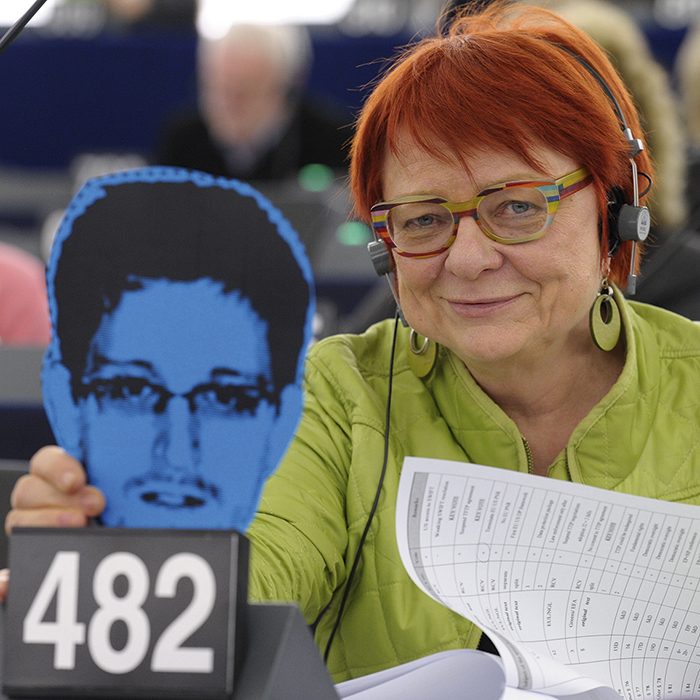“Edward Snowden should have been at the European Parliament this week to give his testimony. Instead, MEPs failed to support a Green call to protect him as a whistleblower. This display of cowardice sends out a negative message that whistleblowers who expose injustice will not be protected.” — The Greens/EFA in the European Parliament
By safeguarding digital spaces through robust privacy laws, data ownership rights, and strict limits on corporate and government tracking, societies can preserve freedom, security, and the psychological sanctuary of the self.
In the digital era, privacy has become a nostalgic concept, like floppy disks. Our digital lives are a sprawling buffet for corporations, governments, and algorithms, all feasting on data with the enthusiasm of a toddler left unsupervised in a candy store. Every click, swipe, like, and GPS ping is meticulously tracked, analyzed, and monetized. Our “smart phones” have been monitoring our conversations.
That innocent-looking smart speaker on your kitchen counter? It’s always listening. Your fitness tracker? It knows more about your body than your doctor. Your phone? A tracking device that also makes calls. We’ve voluntarily bugged our own homes, wrapped ourselves in wearable surveillance, and carried little GPS-enabled snitches in our pockets—all for the sake of convenience. And convenience is the hook. Trade a little privacy for a free app, a discount, or the dopamine hit of social media likes. The normalization of surveillance isn’t just a legal issue; it’s psychological conditioning. We’re being trained to accept that privacy is obsolete, that resistance is futile, and that the only people who care about privacy must have something to hide.
Tech companies call it “personalization,” which sounds cozy, like a monogrammed towel, but what it really means is surveillance wrapped in UX design. Social media platforms, search engines, and apps harvest data not just to sell you products, but to predict, influence, and manipulate your behavior. Your data isn’t the product. You are the product.The business model is simple: collect everything, analyze obsessively, and sell to the highest bidder. What did you Google at 2 a.m.? They know. Which articles did you almost click on but didn’t? They know that, too. Your shopping habits, political leanings, mental health patterns, sleep schedule—it’s all in the dossier. You’re the star of your own reality show, except the audience is advertisers, data brokers, and whoever manages to hack into the system.
Governments, of course, saw this and thought, “Brilliant! Let’s get in on that.” Under the banner of “national security,” surveillance programs ballooned post-9/11 into sprawling data-collection operations that make Orwell’s 1984 look quaint. The NSA’s PRISM program revealed by Edward Snowden pulled back the curtain and revealed that the wizard is, in fact, an all-seeing data hoarder with an insatiable appetite for your metadata.
The erosion of digital privacy isn’t just about data breaches and targeted ads. It undermines democracy. Living under constant surveillance breeds anxiety, erodes trust, and fosters a sense of helplessness. When your data is commodified, your identity becomes fragmented—a collection of profiles and predictive models that don’t capture the complexity of who you are but still shape how you’re treated, from credit scores to job opportunities. When people know—or even suspect—that they’re being watched, they change their behavior. It’s called the panopticon effect, and it turns societies into self-policing units where freedom erodes through quiet, pervasive surveillance. But privacy isn’t about hiding. It’s about control. The right to privacy is the right to decide what parts of your life are public and what parts are yours alone. It’s the digital equivalent of having curtains on your windows—not because you’re doing something illegal, but because it’s your space.
In China’s social credit system, digital surveillance is integrated into a national framework that scores citizens on their behavior. It’s easy to dismiss this as authoritarian overreach “over there,” but the ingredients—mass surveillance, data profiling, algorithmic decision-making—already exist globally. The difference is just a matter of degree and transparency. In the U.S. and Europe, facial recognition technology is expanding despite glaring privacy concerns. Companies scrape billions of images from the internet to train AI models without consent, while law enforcement agencies deploy these tools with minimal oversight. The result? A surveillance infrastructure capable of tracking individuals in real-time, across public and private spaces, without a warrant.
Digital privacy can be reclaimed as a fundamental right. Data minimization should be the norm: collect only what’s necessary, keep it for as long as needed, and delete it responsibly. The European Union’s General Data Protection Regulation (GDPR) gives individuals control over their personal data and imposing hefty fines on companies that violate privacy rights. It’s proof that robust digital privacy laws are possible—they just require political will. Data ownership is key. You should own your data like you own your physical property. That means the right to access, control, and delete your information, as well as the right to know who’s collecting it, why, and for how long. Consent should be meaningful, not buried in legal jargon longer than the terms for a mortgage.
Encryption is an essential tool. End-to-end encryption protects communication from prying eyes, whether it’s a text to a friend or sensitive information shared with a doctor. Governments often argue that encryption hampers criminal investigations, but undermining encryption compromises security for everyone. Privacy and security are allies. Whistleblower protections are vital. People like Snowden risk everything to expose abuses of power. A healthy democracy supports those who shine light into dark corners, not prosecute them for treason. And digital literacy should include privacy awareness, teaching people not just how to use technology but how to protect themselves from its more insidious tendencies. The average person shouldn’t need a degree in cybersecurity to navigate the modern world safely.
We must reject the idea that privacy is obsolete or that trading it for convenience is inevitable. Privacy isn’t dead—it’s just been commodified. Reclaiming it requires seeing through the illusion that surveillance equals safety or that data collection is harmless because “I’ve got nothing to hide.”
Therefore, under Folklaw:
Digital privacy shall be protected as a fundamental human right. Governments and corporations will be prohibited from collecting, storing, or sharing personal data without explicit, informed consent. Data ownership rights will grant individuals full control over their information, including the right to access, modify, and delete their data.
End-to-end encryption will be mandatory for digital communications, with no backdoors permitted. Surveillance technologies, including facial recognition, will be strictly regulated, with transparent oversight and legal safeguards.
Whistleblower protections will defend those who expose privacy violations. Public education campaigns will promote digital literacy, emphasizing privacy awareness and data security.






Discussions
There are no discussions yet.